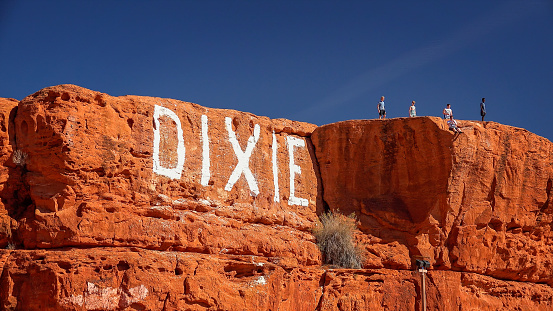Places all over the country have been renaming and rebranding since identifying the negative connotations associated with the D-word. The D-word I am talking about here is probably not the one that you are thinking of. It’s “Dixie,” the former name of a major southern Utah university, and a topic of controversy over the past few years.
On July 1, HB2001 went into effect and Dixie State University became Utah Tech University. The university that welcomes newcomers from all over the country now looks forward to being more inclusive and sensitive as it continues to grow. This name change is now law. And though it is not very fun to change, a survey in April 2021 revealed that a slim majority of people agree that this should be the case. That is the simple part.
But what about all of the landmarks that have been the pride of “Dixie Utah” since the early 1900s or even since its founding? Do we simply erase the stories that these landmarks tell? That issue is a bit more complicated.
Controversies over the Word “Dixie”
The problem is that the word “Dixie,” for many people connotes slavery, Southern plantations and the old confederacy (understandably so), but for others, this forbidden D-word connotes a different thing entirely. This second meaning of “Dixie” is devoid of the horrors of slavery, but filled with values of self-reliance and perseverance, of pioneer heritage and of pride for rural Utah — values that many rural Utahns share.
Unfortunately, this double meaning can be difficult to understand if you’re not from Utah. The Washington Post reported that Darrel Osborne, father of a Dixie State graduate, had difficulty showing pride for his son’s university. He was afraid to talk about a “Dixie State” to his friends, who might interpret the name as being blatantly racist. Osborn felt strongly that Utah Tech should avoid half-measures when it came to changing their name: “if you’re going to change it, change it,” he said. “You can’t have it both ways.”
The University’s solution
Taking into account the multiple meanings of the word “Dixie,” Utah Tech believes that they can, in fact, have it both ways. They emphasize that the rebranding does not have to take away the heritage and pride that Utahns share for their communities, indicating that the new brand “will strongly represent what it means to be a Trailblazer while continuing to preserve the pioneering heritage of our institution and region.” The name change will not affect the university’s colors, mascot or location — still bringing to mind the red rocks, the pioneers and the many people who worked hard to make the university what it is today.
In addition, Utah Tech’s question and answer page states that they have “no desire to take-away or alter the D on the Hill, and the city has no plans to remove Dixie from the large sugarloaf rock.” Both the university and the city of St. George are working to ensure these landmarks are added to the National Register of Historic Places. Out-of-state-ers may ask, “why all the fuss?” Well, because “Dixie” for St. George means home.
Showing Pride without Being Insensitive
So where is the line between pride for heritage and insensitivity?
Like it or not, our names places can have a huge effect on the varieties of people who live, work and move into these communities. Words that once seemed harmless can take on unintended new meanings. We cannot discount the experiences of others, nor should we sit by and let others discount ours. The most important thing is that we remember to make this place a home for everyone: both newcomers and old-timers. Sometimes that means understanding to a point and stubbornness to the end — in other words, having it both ways.
There is a difficult balance between pride for heritage and insensitivity. But Utah Tech is not afraid to take the name change balancing act head on, hopefully leading the way for the rest of us.
– by Abbie Call
Feature image caption: The Dixie rock just outside St. George is the pride of the community. Residents want to be more inclusive of outsiders, but they hope that controversies over the word Dixie won’t tear down their pride for their heritage. Stock photo.

Abbie Call – Cannonville/Kirksville, Missouri
Abbie Call is a journalist and editor at The Byway. She graduated in 2022 with a bachelor’s degree in editing and publishing from Brigham Young University. Her favorite topics to write about include anything local, Utah’s megadrought, and mental health and meaning in life. In her free time, she enjoys reading, hanging out with family, quilting and hiking.
Find Abbie on Threads @abbieb.call or contact her at [email protected].

